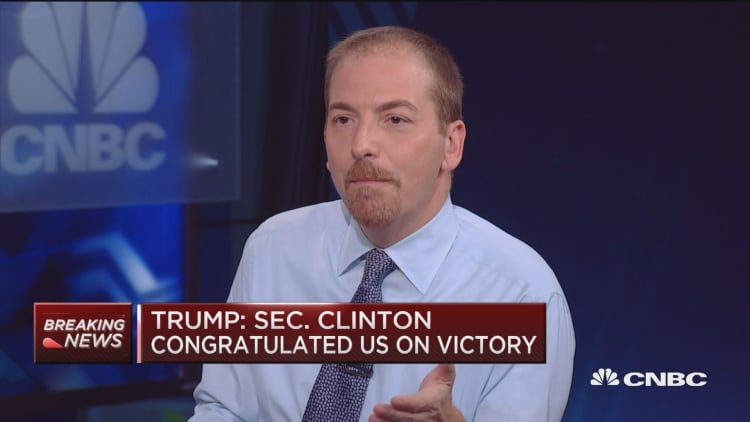If all politics is local, that should provide some encouragement to Democrats. The Republican Party will now control every branch of the federal government — and extended its existing statehouse dominance on Election Day — but not U.S. cities.
Two-thirds of America's 100 largest cities are controlled by Democratic Party mayors. (67 Democrats, 28 Republicans and 5 mayors with an Independent Party or no party affiliation).
"Historically, we've seen a shift over the last 30 years to more Democrats in urban areas and Republicans in rural areas. It just reflects the cultural shifts we've seen in our country," said Brooks Rainwater, senior executive at the National League of Cities (NLC).
The shift has big implications in two major policy areas for a Trump administration, and in the federal government's relationship with local jurisdictions: infrastructure and immigration. And these are areas in which tension between cities and the federal government already exist.
The dominant role of Democratic mayors in America's largest cities is a focus of policy planners on the right.
"Cities are heavily Democratic. It seems unlikely that GOP statehouses or Congress will favor many of their leftist ideas on social and economic policy," said Aaron Renn, a senior fellow and urban policy specialist at conservative think tank the Manhattan Institute. "Leftist mayors and urban residents, for their part, need to rethink their unrelenting hostility to those who don't share their agenda."
'Fixing' inner cities
The first policy pronouncement in President-Elect Trump's victory speech was, "We are going to fix our inner cities."
"Just as it was a mistake for Democrats to demonize and ignore suburban and rural Republican voters, it would be a terrible mistake for Republicans to neglect urban interests. Like it or not, the economic heart of our country is in major metropolitan areas," Renn said.
Renn said the great economic divide is also present in cities, though playing out in different ways, such as debates around gentrification. "Fully integrating black Americans, who still have a major presence in our cities, into middle-class American economic success remains an urgent task I hope Republicans will engage with," he said.
But some urban policy experts bristle at the way Trump and the alt-right movement portrayed inner cities during the campaign.
"We are sort of concerned about how [inner cities] were portrayed during the campaign, said Michael Wallace, acting director of federal advocacy at the NLC. "We just push back against the narrative that cities are run down," Wallace said. "Cities don't need 'fixing.' ... Campaign rhetoric used a lot of stereotypical thinking about cities. We want to make sure it doesn't have an undo influence on governing of cities."
More from CNBC Metro 20:
The 20 worst places in America to start a business
The 20 best places in America to start a business
2 ideas, $200,00 and a plan to revive Rust Belt cities
City economies have driven the economic recovery. Ninety percent of U.S. GDP comes from metro regions. The 30 largest metro areas are responsible for half of national GDP.
At The Initiative for a Competitive Inner City(ICIC), the Roxbury, Massachusetts-based economic development nonprofit founded by Harvard Business School professor Michael Porter, officials were pleased that inner cities became part of the debate over the future of our country, "although the term may not always have been used appropriately," said Kim Zeuli, senior v.p. "The types of infrastructure investment that need to be prioritized depend on the city and inner city, but I think it is safe to say that all inner cities need some infrastructure improvements to support business growth," she said.
In contrast to stereotypes of inner cities that persist, ICIC uses a quantitative definition to identify these areas, and Zeuli noted that for close to two decades already well-known firms have been taking advantage of business opportunities in inner cities.
"There is broad agreement on infrastructure, but when we say 'fixing inner cities,' mayors are best-situated to make decisions about funding coming from the federal government," Wallace said.
The National League of Cities anticipates some fiscal pressure as a result of one party rule in Washington, D.C., but he said the Senate remains closely divided and has the filibuster option. "The writing is on the wall that there will be greater fiscal pressure. We will be making the case about local priority programs. All we can do is make the case for why funding is important," Wallace said.
Urban immigration battlegrounds
No issue has created greater tension between local government and the federal government than immigration. If the Trump administration follows through on the immigration rhetoric of its candidate, hostility between cities and the federal government over immigration could escalate.
It has already been tense under the Obama administration, especially in its first years, when local leaders butted heads with the federal government over immigration policies that compelled cities to share information on unauthorized immigrants that came to the notice of the law.
Cities that resisted and implemented policies to block federal requests for information have been referred to as "sanctuary cities," a controversial term that goes back decades to an earlier wave of refugees from Central America who found safe harbor in some urban areas across the country.
Federal policies that require more sharing of information with the federal government any time an unauthorized immigrant entered the criminal justice system started under the Bush administration and were continued by the President Obama, who was at one point called by immigration critics "the deporter-in-chief." Ultimately, the Obama administration scaled back a major program to only require sharing of information once an unauthorized immigrant was sentenced, not any time they entered the criminal justice system.
Michelle Mittelstadt, spokeswoman for the Migration Policy Institute, said the inescapable fact is that the federal government wields by far the largest power in immigration policy. "To the extent that cities and states have the ability to act, it is against the backdrop of a limited role for them."
In recent years, some cities have made decisions to offer drivers licenses and municipal ID cards to unauthorized immigrants.
"One might see more efforts viewed as helping unauthorized immigrants against a rising levels of deportations," Mittelstadt said. But she stressed that Trump has had any number of proposals, and immigration policy makers will have to wait and see what the reality is. "I imagine it will be a very dynamic area both for the federal government and cities and states, and can anticipate there will be more efforts by cities and other local jurisdictions to blunt, to the extent they can, any significant rise in immigration enforcement."
I imagine it will be a very dynamic area both for the federal government and cities and states, and can anticipate there will be more efforts by cities and other local jurisdictions to blunt, to the extent they can, any significant rise in immigration enforcement.Michelle MittelstadtMigration Policy Institute spokeswoman
Trump said on the campaign trail he would withhold federal funding from cities who did not comply with federal immigration policy. He also said in a 60 Minutes interview of Sunday night that he would immediately deport two to three million unauthorized immigrants who are criminals, but referred to unauthorized immigrants as "terrific people" more broadly, and said broader immigration policy decisions will take time. The mayors of New York and San Francisco have already voiced their concerns about Trump's immigration plans since his election and said they will remain "sanctuary" cities.
Already there are at least five bills in the Senate and eight in the house trying to target "sanctuary cities" and the noncompliance policies.
Sen. Chuck Grassley, R-Iowa, introduced Kate's Law — referring to a San Francisco woman murdered by an unauthorized immigrant — that would bar jurisdictions that resist cooperation with Immigration and Customs Enforcement from getting federal grants. Other legislative efforts make non-cooperation policies illegal in full.
"One would imagine it's an area where Congress and the Trump administration would look in the future," Mittelstadt said.
Wallace at the National League of Cities said "horsetrading" of federal money over social issues would be a real problem. And it has already shown up in the "sanctuary cities" issue.
"We're very opposed to the idea that the federal government could label a city as a sanctuary city and threaten to withhold important social funding that would hurt the most vulnerable people," Wallace said. "It's a very dangerous path."

The half of America that felt forgotten in the "flyover" regions voted to elect Donald Trump. Another half of America may feel disoriented by the seismic change at the level of the federal government.
Cities may be a good place for many Americans to recalibrate their identity.
"A mayor's core role is always to make sure the operations of the government run well, but we elect officials at the local level that reflect our community values, from family leave laws to immigration and innovation policies coming out of cities," NLC's Rainwater said. "I do think while the functioning of the government will always be job No. 1, cities will focus on issues that matter to them."
Mayors may want to promote social policies that reflect their communities and culture, but in many areas that don't relate directly to city services, they have limited policy power. "Constitutionally, mayors are weak players," Renn of the Manhattan Institute said. "Unlike our federal system of dual sovereignty between the federal and state governments, cities are creations of the state and largely controlled by them."
Renn expressed an overarching belief that both cities and suburbs need to be healthy. "We've lost this sense in America that we are a commonwealth, that we rise and fall together as a people. We need to seek to restore it, which requires all sides of our various factions to make significant change."
"You can have disparate interests come together in a city in a way you can't do elsewhere," said NLC's Wallace.





